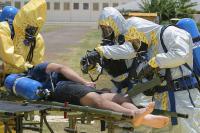-
Former British topless model arrested for links to ISIS
Former British topless model, 27, arrested for communicating with ISIS recruiters and distributing violent ISIS propaganda videos on social networks. He contact was a British citizens calling himself Abu Usamah al-Britani, a known ISIS recruiter operating out of Syria. Terrorism experts say his “specialty” is trying to persuade young Western women to come to Syria to marry jihadist fighters.
-
-
Former British topless model arrested for links to ISIS
Former British topless model, 27, arrested for communicating with ISIS recruiters and distributing violent ISIS propaganda videos on social networks. He contact was a British citizens calling himself Abu Usamah al-Britani, a known ISIS recruiter operating out of Syria. Terrorism experts say his “specialty” is trying to persuade young Western women to come to Syria to marry jihadist fighters.
-
-
U.S.: UN should investigate war crimes committed by Russia, Syria in Aleppo
U.S. Secretary of State John Kerry said that the military campaign by Russia and Syria against civilians in Aleppo amounts to a war crime, and that the UN must launch a war crime investigation into the two countries’ actions. Military analysts noted that the Russian and Syrian campaign aims not only to kill civilians directly by dropping barrel bombs on Sunni neighborhood. Assad and his Russian allies deliberately increase the death toll by using bunker-busting munitions systematically to destroy the city’s civilian infrastructure — hospitals, clinics, water treatment facilities, and power stations. The analysts say that Assad’s ultimate goal is to make life in the city impossible, thus forcing hundreds of thousands of Sunnis to flee, making it easier for his Alawite and Shi’a forces to control the city once they recapture it from the rebels.
-
-
Clown threats may be unnerving, but they are not terrorism
The fear of clowns has been around for decades, perpetuated by Stephen King’s 1986 novel “It” as well as dozens of TV shows and movies. But what previously was an underlying nervousness recently has mushroomed into a more immediate threat as a result of media reports of clowns approaching or appearing to threaten children. Some have called the incidents “clown terrorism,” but a terrorism expert says that despite the growing sense of fear, it is important to avoid calling the threats and attacks acts of terrorism.
-
-
Families of Iraqis killed during U.S. invasion, occupation to seek compensation from U.S.
Representatives of families of Iraqis who were killed in the U.S.-led invasion of Iraq in 2003 and subsequent 8-year occupation say the families are entitled to seek compensation from the United States for damages they suffered during the war. The representatives asked the Iraqi government to prepare a lawsuit seeking full compensation from the United States over “violations by the U.S. forces.” The request was made after the U.S. Congress last week passed a law — Justice Against Sponsors of Terrorism Act (JASTA) — overriding the principle of sovereign immunity.
-
-
Southwest Airlines, police remove Muslim from plane for saying “inshallah”

Khairuldeen Makhzoomi, a 26-year-old Berkeley graduate, was removed from a Southwest Airline plane at Los Angeles International Airport in April this year — after another passenger overheard him speaking Arabic on his mobile phone. He was escorted off the plane by police officers, searched, and dogs sniffed his luggage. The Department of Transportation is investigating. “This is our home,” he said of the United States (he came here legally in 2010). “We don’t have another home. The experience [in April] was just unpleasant,” he said.
-
-
Terrorism fallout shelters: Is it time to resurrect nuclear civil defense?
Fifty-five years ago, on 6 October 1961, President John F. Kennedy advised Americans to build an underground protective room, commonly known as a “fallout shelter,” in their homes. The American people heeded his advice and began an enormous grassroots effort to construct fallout shelters in every private residence and public building. Today, smaller nations and terrorist groups, such as al-Qaeda, are seeking nuclear weapons. Some nations, like North Korea, already have them. Others may be a decade away. It is not unreasonable to believe that the use of a single nuclear weapon by a rogue nation or a terrorist group now poses a more likely scenario for a nuclear confrontation than a nuclear war between Russia and the United States. We need a strategy to protect ourselves against these adversaries, and right now we don’t have one, except screening cargo. If we don’t find a more effective strategy to thwart nuclear terrorism soon, we may be forced to go back to fallout shelters as our only protective option, whether we like it or not.
-
-
A nerve agent antidote taken before a chemical weapons attack

Nerve agents are molecular weapons that invade the body and sabotage part of the nervous system, causing horrific symptoms and sometimes death within minutes. Few antidotes exist, and those that do must be administered soon after an attack. Now, scientists an early-stage development of a potential treatment that soldiers or others could take before such agents are unleashed.
-
-
Iran-Backed Iraqi militias pour into Aleppo, sparking fears of their use as a regional force
The recent influx of Iran-backed Iraqi Shiite militias into Syria has helped tilt the fight for Aleppo in favor of Syrian dictator Bashar al-Assad, and possibly portends the emergence of the militias as a larger, externally focused force throughout the Middle East. The growing prominence of Shiite militias has stoked fears among Sunni powers that Iran is creating a “Shiite Crescent” in order to bolster its influence across the Middle East.
-
-
Indian police arrest pigeon carrying threatening note against PM

The Indian police said they have taken a pigeon into custody after the bird was found carrying a threatening note against Prime Minister Narendra Modi. This is not the first time birds have become tools in the on-going skirmishes between the two countries. The Indian police, in 2015, captured and detained a pigeon on suspicion of spying for Pakistan. The bird was X-rayed to see whether it was carrying a spy camera, transmitter, or hidden chip. Two years earlier, in 2013, the Indian military found a dead falcon fitted with a small spy camera, and in 2010 the Indians detained another pigeon on suspicion of spying.
-
-
Comparing U.S. deaths from terrorism vs. gun violence
The number of Americans killed in acts of terrorism – both on U.S. soil and abroad — between 2001 and 2014 is 3,412 (including the victims of the 9/11 attacks). During the same period, 440,095 people died by firearms on U.S. soil (homicides, accidents, and suicides). In 2014, for every one American killed by an act of terrorism in the United States or abroad, 1,049 Americans died in the United States because of guns.
-
-
Syrian rebel leader: Assad is the main enemy, not Israel
Mohammed Alloush, the leader of a coalition of Sunni rebels fighting against the regime of Syrian President Bashar al-Assad, said his group, which includes Islamists, has no desire to go to war with Israel. His attitude reflects the privately held positions of many Sunni Arab governments. Alloush’s statements also show that Israel has purchased some goodwill among the Syrian opposition. He told a Western reporter that Israel’s treatment of Syrians fighters and civilians who come to the border seeking medical attention is an important humanitarian gesture.
-
-
Why Colombia voted “no” to peace with FARC

It seemed like a done deal. After sixty years of fighting, three years of detailed negotiations, and a peace agreement signed in front of the head of the United Nations, the horrific conflict between the Colombian state and the Marxist Fuerzas Armadas de Colombia (FARC) finally seemed to be over. The peace process looked set to be a model for future negotiations around the world; all it needed was public approval. And then, in the referendum that was meant to finish the job, 50.24 percent of voters rejected the agreement – with fewer than 40 percent even showing up. It’s hard to know what happens next: more negotiations, another offer, reinvigorated conflict. The already weakened FARC might yet fragment, making another deal less robust; the government might shift back to the right, possibly heralding a return to a war fought through paramilitary proxies. Whatever happens, Colombia needs to find a way for all its people to discuss their own war – and their own peace – in a way that validates their experiences and does not escalate the violence further.
-
-
The 52-year war in Colombia: The numbers
The toll of the 52-year was in Colombia: 267,000 killed; 6.7 million people forcibly displaced; 46,386 victims of forced disappearance; 29,622 kidnapped; 8,022 children soldiers used both by FARC and right-wing paramilitary groups; 4,392 victims of extrajudicial execution by the government security forces
-
-
ISIS regards battle for Dabiq as an apocalyptic showdown of Muslim and Christian armies
This may not be the end of the ISIS caliphate – which military experts say will occur sometime during the second half of 2017 – but the Islamist organization views the coming battle for the town of Dabiq in apocalyptic terms nonetheless. U.S.-backed Syrian opposition forces and Turkish military units are within forty-eight hours of reaching the ISIS-controlled Dabiq, which jihadists regard as the preordained site of the final apocalyptic battle between Muslims and Christians.
-
More headlines
The long view
How Male Grievance Fuels Radicalization and Extremist Violence
Social extremism is evolving in reach and form. While traditional racial supremacy ideologies remain, contemporary movements are now often fueled by something more personal and emotionally resonant: male grievance.
